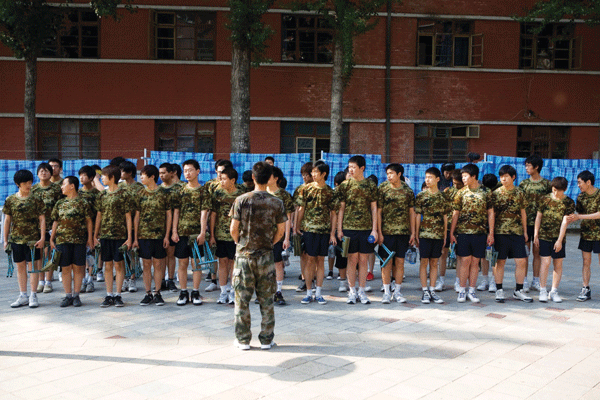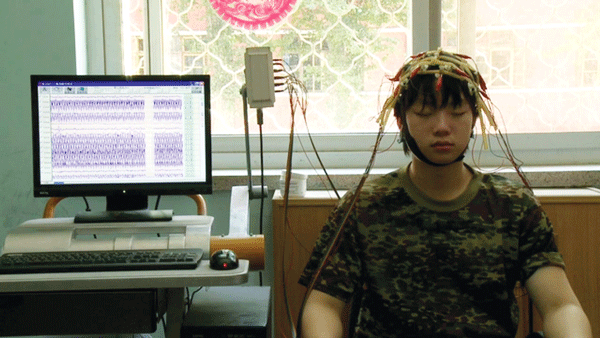
BY SEAN EGAN | In our tech-obsessed culture, nearly everything has Internet capabilities — even if there seems to be no reason for it. Our phones, video game consoles and televisions are wired to the World Wide Web 24/7. Hardly a second goes by without us having immediate access to the Internet if we so choose. And it seems, increasingly, like we want to spend our lives online — from sharing clickbait articles and viral videos, to binging on Buzzfeed quizzes and Candy Crush. But how many of us would consider the time consumed by our frivolous online habits a serious problem? The new documentary “Web Junkie” takes a look at what happens when a culture treats excessive Internet usage as a serious mental health issue.
In China, the use of the Internet for non-work or studying-related purposes for six or more hours daily has been classified as a psychological disorder. In order to combat this affliction, which affects mostly teenage boys who play online games, China has built hundreds of rehabilitation facilities. Boys arrive at these facilities (usually tricked or drugged by their parents) and are subjected to boot camp discipline, rigorous schooling and lectures — often, for months.
‘Web Junkie’ is a complex, emotional look at Internet addiction
Documentarians Shosh Shlam and Hilla Medalia gained access to one such facility in Daxing, a suburb of Beijing, for the filming of “Web Junkie.” By following a few teens — two named Hope and Nicky, in particular — at various stages of their treatment, the filmmakers examine the personal toll the camps and their programs take on patients and families, as well as what the issue of “Internet addiction” means for China as a whole.
FILM | WEB JUNKIE
Directed by Shosh Shlam & Hilla Medalia
2014
Runtime: 79 minutes
August 6–19
At Film Forum
209 W. Houston St., West of Sixth Ave.
Screenings at 12:45, 2:40, 4:45,
7:00 & 9:10 p.m.
Tickets: $13
Film Forum members: $7.50
For tickets & info: filmforum.org
Though the concept of Internet addiction rehab facilities might seem absurd at best, and gross overkill at worst to uninitiated Western audiences, “Web Junkie” is admirably ambiguous when it comes to addressing the issues at hand. This non-judgmental stance is wise, in that it allows audiences to consider the legitimacy of every party’s claims.
It’s easy to side with the kids, initially. Being sent against their will to these camps makes them sympathetic, since it seems like such a steep price to pay for a minor infraction. However, the more the kids talk about their gaming habits — from spending thousands on in-game add-ons, playing for days or weeks on end without proper sleep (and, in Hope’s case, orchestrating an escape from the facility to play at an Internet café), the more it seems like “addiction” may be a fitting label. At the very least, many of these boys seem to have other issues, like depression or anxiety that require treatment.
The authority figures are similarly complex. Parents who initially seem harsh and distant are gradually seen as desperate, having turned to the camps after years of growing further apart from their kids. It’s out of fear and love they subject their kids to this treatment, as well as a lack of understanding. A generational gulf prevents them from seeing eye to eye — as when Nicky’s parents regard the Internet as an inherently fake distraction, while Nicky sees it as just another aspect of reality, a coping mechanism to connect with other like-minded people.
Daxing itself is also more complicated than it seems. Underneath the military drills, isolation exercises and apoplectic lectures on the dangers of “electronic heroin,” there is a staff of doctors who are working hard to try to better define the condition and heal the damaged parent/child relationships. Because of this, the film becomes less of a finger-pointing session or an exposé on a little-known reality, but rather a meditation on how people with good intentions can best address a very real problem that remains ill-defined and misunderstood.

Also at play is cultural climate of China, and how it affects the children and their situation. The parents begin to articulate how the pressures of society drive them and their children to behave the way they do — specifically, in how China’s “one child” policy makes children more lonely, and prone to finding companionship and escape online. Both the parents and the children also feel the effects of China’s grade-obsessed culture, as parents begin to regret how hard they pushed their kids.
Then there’s the issue of “Internet addiction” — which China cites as a top health threat for youths — and the camps themselves, which show how ill-equipped the country is at handling the situation through any means but force. As the teens laugh their way through their treatment, joking about how they’re paying lip-service to the higher ups and will go back to gaming once released, one gets the distinct impression that almost none of the camp’s methods are actually successful at all.
Although the film works well when touching on the larger societal implications of the phenomenon, it’s at its best when focusing on the individual cases. Here, “Web Junkie” allows viewers to grasp the struggle on a gut, rather than intellectual, level. Child/parent therapy sessions prove to be startling and emotionally volatile, finding the participants at dark and honest moments. One standout scene finds Nicky, who has become suicidal, threatening both his father’s and his own lives due to a sense of hopelessness and alienation. Another shows Hope gradually reconnecting with his emotionally removed father. In raw and emotional moments like these, “Web Junkie” is elevated from an interesting think piece into a film with ability to genuinely move audiences, allowing its message to better take hold.
The technical aspects also distinguish “Web Junkie,” whose cinema vérité style gives the viewer a fly-on-the-wall look at the institution’s questionable rehabilitation methods. The lightly pulsating rock-based score creates a certain sense of urgency, without becoming too invasive. Most importantly, the editing keeps everything moving along briskly, dispensing information quickly and efficiently for uninitiated viewers, but letting emotional beats linger just long enough to have the maximum impact.
This amounts to a tightly wound, engaging movie. “Web Junkie” is the special documentary that manages to be entertaining and informative, as well as emotionally involving — without ever pandering or underestimating the audience’s intelligence. It appeals to the intellect to get across complex ideas and concepts, and the heart to tell deeply felt, human stories — causing the questions it raises to linger in the mind long after it’s finished.





























